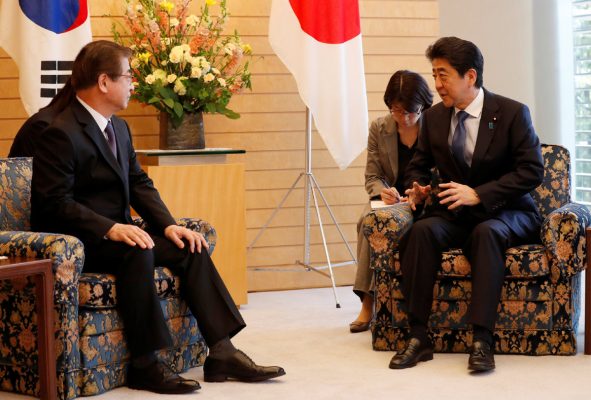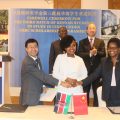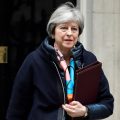
Japan should clarify its stance on Korean Peninsula issues and avoid using it to ease domestic political pressure, an expert said, as Tokyo has shown its anxiety over the upcoming DPRK-US dialogue.
On Tuesday, Republic of Korea President Moon Jae-in’s special envoys met with Japanese Prime Minister Shinzo Abe in Tokyo to explain the result of their visits to Pyongyang and Washington last week.
“I believe it is extremely important that North Korea takes concrete actions to achieve what it has said,” Abe said.
The ROK’s presidential Blue House said Abe told Suh Hoon, director of the National Intelligence Service, he did not believe the Democratic People’s Republic of Korea would use the summits to buy time to pursue its nuclear and missile programs, Reuters reported.
Chung Eui-yong, top security adviser for Moon, and Suh had brought Pyongyang’s message to Washington and met with US President Donald Trump.
Suh met with the DPRK’s top leader Kim Jong-un last week in Pyongyang, where Kim agreed to hold a summit meeting with Moon in late April in the truce village of Panmunjom.
Trump accepted Kim’s willingness to hold a DPRK-US summit, saying he would meet with Kim by May to achieve permanent denuclearization.
Meanwhile, Japanese Foreign Minister Taro Kono said on Monday that Japan was ready to “fully” support inspections of DPRK’s nuclear facilities by the International Atomic Energy Agency if Pyongyang accepted the scrutiny.
“If North Korea accepts inspections, Japan will fully cooperate in financial aid and other things so that the IAEA would be able to conduct inspections immediately,” Kono said.
“We have told the South Korean side about our stance,” Kono added without elaborating.
Shi Yongming, an Asia-Pacific studies researcher at the China Institute of International Relations, said in the recent period, neither the US nor ROK has publicly mentioned the inspections of DPRK nuclear facilities by IAEA.
Tokyo’s proposal to pay the IAEA’s inspection fee shows Japan’s consistent attitude of putting pressure on the DPRK, Shi said, added that it is a sign of Abe administration’s anxiety of the upcoming DPRK-US dialogue would make Japan “an outsider” in the Korean Peninsula issue.
According to Kyodo News, Tokyo plans to cover most of the initial cost of 350 million yen ($3.3 million) to 400 million yen needed to finance inspections of the DPRK nuclear complex. Japan is also considering offering more help if the cost goes up, Kyodo said, quoting government officials.
Shi said the Abe administration has always believed that the unstable situation in the Korean Peninsula is a persuasive reason for the upgrading of Japan’s military forces, as well as providing a chance to tell his nation of his government’s “important role” in international issues.


